News & Stories
GEL’s virtuous cycle of success
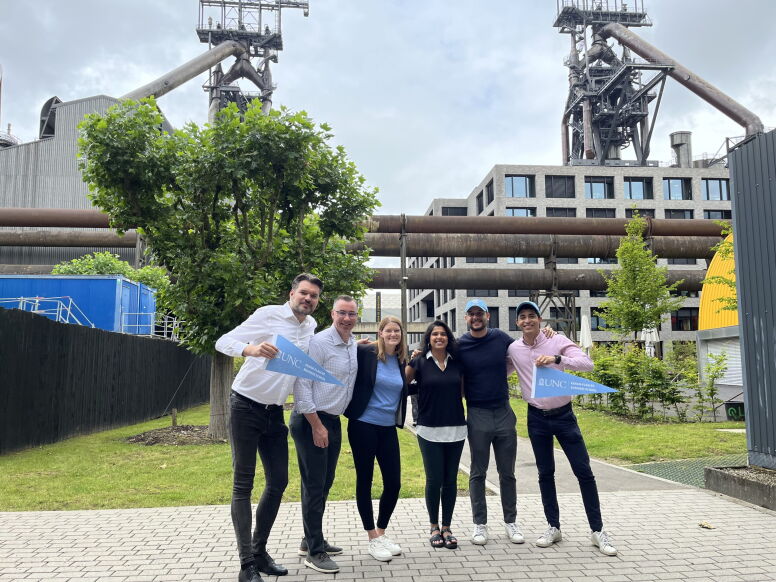
In 2008, Iceland’s economy — bolstered primarily by fishing, aluminum production and tourism — was on the brink of collapse.
In 2022, Amanda Schroeder Bergey (BSBA ’18, MBA ’22) was in Reykjavik working with RetinaRisk. The startup had developed technology using artificial intelligence where a patient with diabetes could take a picture of their eye to determine their risk for retinopathy, a leading cause of vision loss and a common indicator of increased risk of stroke and heart disease.
RetinaRisk successfully launched its product and was looking to expand into the U.S. For insights, the startup leaders relied on Bergey and her team of fellow UNC Kenan-Flagler Business School students through the School’s Global Entrepreneurship Lab (GEL).
The course pairs students in the Evening, Weekend and Charlotte Executive MBA Programs with dozens of startups in countries where modern entrepreneurism is rapidly driving diverse economic growth.
“At first you think, ‘They need our help?’” says Bergey. “But soon we realized they genuinely did need and want our help. That was a special moment for me and a realization of the value an MBA degree from UNC Kenan-Flagler and just how much we can bring to the table.”
Before signing up for GEL, Bergey was interested in pursuing a more strategic role at GlaxoSmithKline. When one of the company’s presidents was looking for a chief of staff, she wasn’t sure if she was right for it. After experiencing GEL, she took the job.
“There are entrepreneurial skillsets that are required to be a C-suite leader in corporate America, even if you don’t have an interest in starting your own business,” she says. “You have to be inquisitive. You have to be flexible. You have to keep your options open. You have to be creative. Experiencing all of that through GEL has already paid off.”
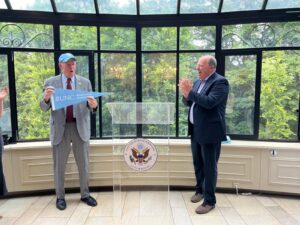
Professor Ted Zoller (right) presents U.S. Ambassador Thomas M. Barrett with gifts during the 2024 GEL in Luxembourg.
Deep entrepreneurial impact
Since 2011, the GEL course taught by Ted Zoller (PhD ’10), T.W. Lewis Clinical Professor of Strategy and Entrepreneurship, has connected MBA students with startups in Austria, Iceland, Luxembourg and Denmark. Modern entrepreneurism is rapidly driving diverse economic growth and new business leaders are looking for detailed insights into the U.S. entrepreneurial landscape.
Leading up to the weeklong in-country engagements with CEOs, CFOs and company founders, GEL students work virtually for months with startups. During the course, student teams find solutions to a range of issues posed by companies with limited experience in U.S. markets and limited knowledge of the complexities of its entrepreneurial ecosystem.
After months of extensive research, emails and Zoom calls with company leaders, students travel to meet them on their home turf and present their findings and suggestions for solutions. While abroad, students experience first-hand the burgeoning entrepreneurial atmospheres of the country they had also spent months studying in Zoller’s course.
“GEL is a gift that keeps on giving,” says Zoller. “Students recognize that if these startup leaders can do it, they can do it. Many become successful entrepreneurs themselves. So many of our executive MBAs have done just that, and largely because they were given the confidence they can do it through GEL.”
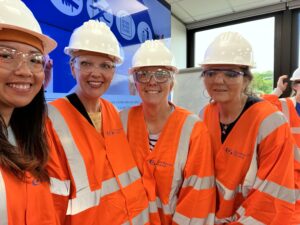
Dawn Turner (center left) and Tara Bain (center right) visited Guardian Glass in Luxembourg.
Some students who apply for GEL (the 2024 application cycle opens Oct. 23) are motivated by a previous lack of exposure to global business practices. Others are like Victra Vice President of Operations Joey Halley (MBA ’24), who has long worked in a corporate environment and had never felt the rush of venturing out to do his own thing before GEL. His team worked with MoveMe, a digital platform that helps students and professionals relocating to other countries navigate the immigration process. Its founders are interested in expanding to the U.S.
“We recognized it was an opportunity to improve people’s lives, especially for young students looking to expand their options by furthering their education in different countries,” Halley says. “We saw there was real meaning in the work that we were doing and in the platform that they had created.”
Students who apply for GEL don’t necessarily have the Next Big Idea or the desire to be venture capitalists.
As senior director of brand and consumer marketing for Tepper Sports & Entertainment, Dawn Turner (MBA ’24) oversees brand strategy for the Carolina Panthers, Charlotte Football Club and Bank of America Stadium. Her GEL team worked with Trensition, a software company in Belgium behind the strategic intelligence platform Trendtracker. She has worked internationally and viewed GEL as an opportunity to further her business acumen.
“GEL is a life-changing program because it impacts your whole being,” she says. “As you dig in and better understand a country’s startup ecosystem, it brings out that little bit of entrepreneurial spirit in us all.”
Every GEL experience is unique, but all students have a strong desire to flex their creative business muscles and broaden their understanding of evolving and diverse practices within global industries. They discover they have the business knowledge and drive to make an impact on a global scale.
“I remember telling Ted that I had felt like there were always things that were impossible to do,” says Meghna Prasad (MBA ’24), a Caterpillar senior control systems engineer who took part in the 2024 GEL in Luxembourg. “But after that week and listening to the startups and the ideas that they have and they’re executing, it truly felt like nothing was impossible. The things I thought were never possible, not worth it, not going to happen are what these companies did.”
Other GEL alums are inspired to push themselves out of their business comfort zones. For as long as she has happily worked for Charlotte-based healthcare company Premier Inc., Tara Bain (MBA ’24) has kept a “very good business idea” to herself. That might change after her Luxembourg GEL.
“I wouldn’t call myself super-entrepreneurial, but I am highly creative and have a lot of ideas,” says Bain. “Now that I finished Ted’s class, I am reinvigorating that part of me. The more people I tell about it, the more they say, ‘You should do this. Why aren’t you doing this?’”
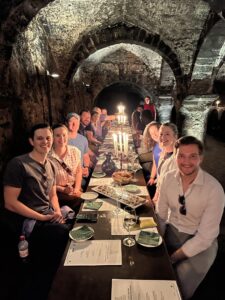
GEL students dine in a Roman wine cave in Trier, Germany.
Taking action
GEL wouldn’t be GEL without Zoller’s grounded vision of entrepreneurism, his dedication to helping build global entrepreneurial economies, and his deep well of global business connections.
In 2010, he gave the keynote address at the first Startup Iceland conference and has been working with the country’s business and government leaders ever since. His friend, Iceland President Halla Tómasdóttir, was one of the entrepreneurs who were part of the country’s entrepreneurial transformation. Zoller knows the major players in global entrepreneurism so well that he can connect them spur-of-the-moment with students during their in-country GEL studies.
He created the GEL program in 2011 in Austria and has spent 10 years on various projects in Denmark and Iceland with the long-term goal of transitioning their economies to a strong entrepreneurial ecosystem.
He is in his fifth year doing the same in Luxembourg. When he received a Fulbright Fellowship in 2023, Zoller’s work at the University of Luxembourg included bringing GEL to the country and offering a summer school for innovation for the university’s faculty and post-doctoral students. Luxembourg was the perfect fit because he’s drawn to smaller countries making outsized business impacts.
America’s greatest export, says Zoller, is entrepreneurship.
“Entrepreneurism is about building up from the bottom. It’s taking action and giving people agency,” he says. “What I’ve learned and seen unfold for students is the understanding that it takes one individual to make a change and just throw themselves in the middle of it all. It’s not about becoming a multimillionaire. It’s embracing personal initiative and action, giving someone the confidence and gumption to just go and do it — because they can.”
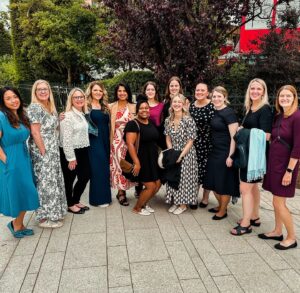 Zoller works closely with Kaitlyn Murphy, associate director of MBA Global Programs, to maintain the meaningful approach to entrepreneurism exploration that is GEL’s hallmark. GEL will return to Luxembourg in 2025, and Zoller hopes to expand GEL to Latin America, where some of the most interesting entrepreneurial stories are found.
Zoller works closely with Kaitlyn Murphy, associate director of MBA Global Programs, to maintain the meaningful approach to entrepreneurism exploration that is GEL’s hallmark. GEL will return to Luxembourg in 2025, and Zoller hopes to expand GEL to Latin America, where some of the most interesting entrepreneurial stories are found.
“International experiences have the power to be life-changing, to change you personally and professionally, to get you to look at the world in ways that you never could if you just remained in the U.S.,” says Murphy, “Through GEL, students are more than consultants. They become a working member of a startup and help it grow by leaps and bounds.”
That happens not just because students are applying what they’ve learned in Zoller’s course to the real world. It happens because he believes in each one of them.
“Most people have a nascent ability to act entrepreneurially,” he says. “But until they’re engaged in it, they really can’t express that. GEL is the tool of expression. An entrepreneurial mindset can be in your life no matter what role you play.”